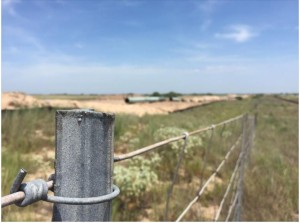
Natural gas pipeline route to become butterfly "pollinator pathway"

A pipeline to move natural gas from the Eagle Ford Shale to customers in Mexico will soon double as a "pollinator pathway" for migratory Monarch butterflies.
The Houston office of Canadian pipeline company Enbridge Inc. (NYSE: ENB) and Houston-based King Ranch Inc. announced the habitat restoration project at a press conference in Kingsville late Friday morning. The two companies jointly donated $100,000 to the Kingsville-based Caesar Kleberg Wildlife Research Institute to plant native grasses and wildflowers along a 42-mile segment of the Valley Crossing Pipeline's route.
Located along the Monarch butterfly's primary migratory corridor along the Texas Gulf Coast, that segment of the route will become one of the largest uninterrupted pollinator pathways in the United States.
“We are impressed by the work done by the Caesar Kleberg Wildlife Research Institute to restore critical natural resources and believe this project will benefit landowners, industry and the habitats of this region and beyond for years to come," Enbridge President of Gas Transmission and Midstream Bill Yardley said in a statement.
Construction for the Valley Crossing Pipeline is more than 70 percent complete. The 176-mile natural gas export project begins near Agua Dulce and travels south to the Port of Brownsville and then under the Gulf of Mexico, where it connects with a pipeline from Mexico at the international boundary line.
Enbridge has a $1.5 billion contract from the Mexican government to build the cross-border pipeline. The shale gas export project faces opposition from the Sierra Club and other environmentalists.
The Federal Energy Regulatory Commission granted a permit for the cross-border natural gas pipeline project in October. Company officials confirmed that all but one of its underwater drills have started.